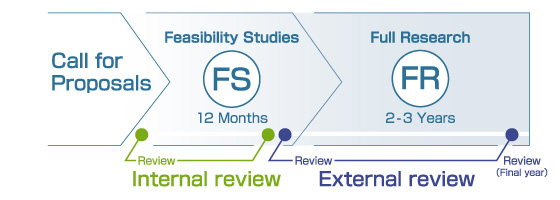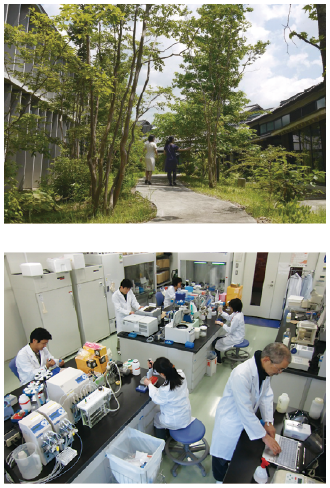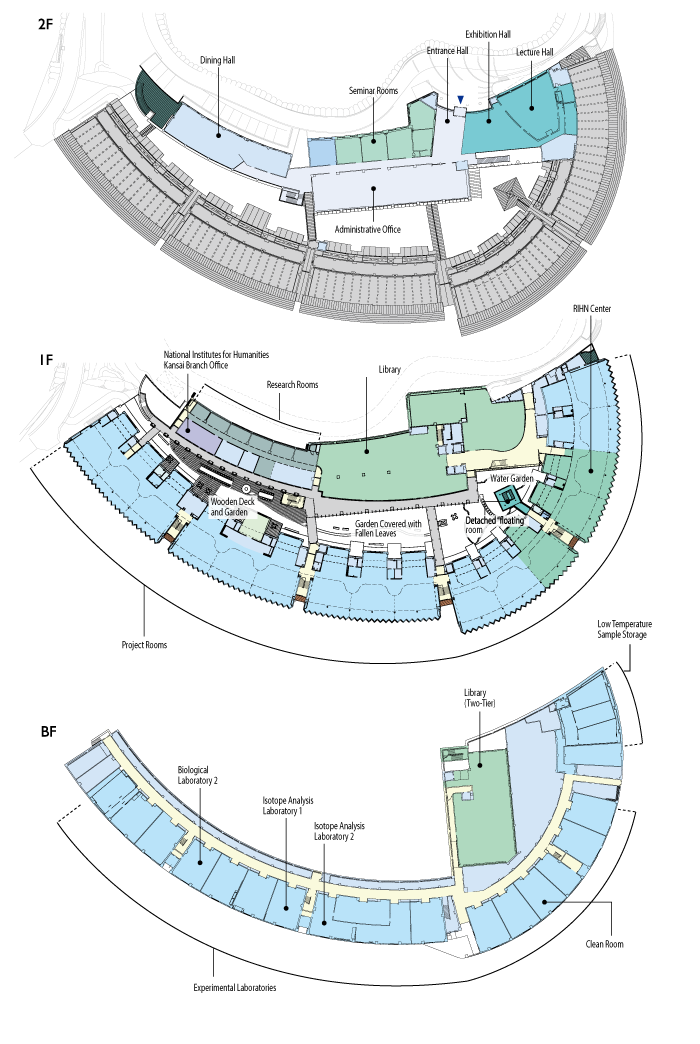
About RIHN
Message from the Director-General
YAMAGIWA Juichi

Most human beings have benefited greatly from modern civilization. If we continue down the current civilizational path, however, weather and water-related natural disasters will intensify, ecosystem degradation and loss of biodiversity will increase, and human livelihood, health, and safety will be at ever-greater risk. Modern civilizations have incessantly expanded the scale of production and consumption, but at nature’s expense, and humans are both the perpetrators and victims of this path of development. The Covid-19 pandemic clearly shows the result, as it was caused by ever-expanding global human activities.
New technological fixes will not offer fundamental solutions to such complex problems, unless human lifestyles also change to achieve harmonious relationships with nature on Earth. For the last 20 years RIHN has conducted research with the awareness that the roots of global environmental problems are found in human culture. Based on the results of our past projects, it is time for us to promote new practical research.
Cultural diversity is based on the diversity of nature. However, nature forms ecosystems in which regions are connected through the circulation of materials and energy, while cultures insist on their uniqueness and are sometimes in conflict. Solutions to global environmental problems therefore depend on connecting cultures through common environmental ethics. Great traditions of Eastern environmental wisdom and experience still exist, as do those of other regions; their valuable insights can help to break the deadlock in modern science and capitalism. It is for this reason that RIHN undertakes interdisciplinary research spanning the natural sciences, humanities, and social sciences, and in recent years, has evolved towards transdisciplinary research seeking to expand the kinds of knowledge that are considered valid in scientific inquiry.
RIHN has recently established three Research Programs, one Core Program, and the RIHN Center to promote such research. We have enhanced collaboration within the institute, across the diverse research community linked to RIHN research projects, and with society in general. RIHN also collaborates with the international research platform Future Earth, which aims to integrate global environmental change research and contribute to the United Nations Sustainable Development Goals. As part of this effort, RIHN hosts the Future Earth Asian Regional Centre to strengthen research collaboration and capacity building across the region.
We will strive to expand these activities in the coming years, and implement new research initiatives in the search for solutions to the many environmental challenges of our planet.
▲PAGE TOPRIHN Philosophy and Approach
Environmental problems now confront human communities at all scales. Despite extensive research carried out the disciplines, however, many environmental problems remain unresolved. There is therefore need to go beyond partial descriptions of discrete environmental problems in search of holistic understandings of their underlying causes and integrated approaches to their solutions.
The Research Institute for Humanity and Nature is a national research institute established by the Government of Japan in 2001. As a member of the National Institutes for the Humanities, RIHN research starts from the premise that environmental problems are rooted in human culture and societal values. RIHN’s goal is to seek concepts, theories and mechanisms that enhance human quality of life in direct relation to environmental conditions and ecological processes. RIHN research therefore involves a normative dimension, as it asks what the relationship between humanity and nature ought to be. To this end, RIHN solicits, funds, and hosts integrative research projects investigating environmental change problems in specific settings. Research projects are undertaken by interdisciplinary teams at RIHN, working together with partner institutions and communities in Japan and abroad.
RIHN promotes the co-design and co-production of research, in which societal actors are directly involved in defining environmental problems and developing new research approaches and potential solutions. RIHN research is increasingly transdisciplinary in that it seeks to redefine the role of science in society, improve dialogue between different traditions of knowledge, and stimulate new multi-actor local, national and international collaborations. This approach draws from the natural and social sciences, arts and humanities, and engineering and design.
Environmental science cannot be conducted or applied uniformly to the world. RIHN science is informed by lived social practices and communal values, especially as found in Asia. The most populous region of the world, Asia is essential to any global sustainability. At the same time Asia is home to many examples of long-term culturalecological continuity whose significance to contemporary environmental challenges is still largely unstudied. RIHN depends on long-established research networks in Asia and contributes to transdisciplinary initiatives in the region, including by serving as host of the Regional Centre for Future Earth in Asia.
RIHN research is guided by the following three objectives:
- Conduct research that analyzes the interaction between humanity and nature and critically examines the sustainability of human societies, based on past RIHN research and international literature and experiences
- Apply research results to solve real-world sustainability problems
- Promote solution-oriented research on environmental challenges that is co-designed and co-produced in close collaboration with societal stakeholders
Organizational Structure
RIHN is a project-based institute, with research projects lasting from five to seven years. New research projects are publicly solicited. Initial proposals ideas are gradually developed through several stages into fully-fledged projects; they are finally evaluated by an international external review committee. At this point, the proponent joins the RIHN community as a faculty member of the Institute. Individual project include a core team of researchers based at RIHN and a much larger network of partners at research institutions throughout Japan and abroad.
RIHN Programs
RIHN research is organized into Programs and Projects rather than pre-existing academic disciplines or domains. Three Research Programs and one Core Program are each home to multiple projects that carry out research in line with the Program’s broad direction. The bundling and integration of Projects within the Programs facilitates synthesis of research results and allows for strategic planning of research. Programs are subject to annual review by the External Research-Evaluation Committee (see RIHN Project Trajectory on pages 6 & 7). RIHN endeavors to improve its research by making good use of the review results while also respecting the independence of each Program.
Research Programs
RIHN research projects are organized into three programs, each of which is organized around central themes identifi ed in RIHN’s Phase III Medium-Term Plan (to be revised in 2021). Along with the RIHN in-house Core Program, each program is home to multiple projects that carry out research in line with its broad research agenda. The bundling and integration of projects within the programs facilitates synthesis of research results and strategic planning. Programs are subject to annual review by the External Research Evaluation Committee (see RIHN Project Trajectory on pages 6 & 7). RIHN endeavors to improve its research by making good use of the review results while also respecting the independence of each Program.
Program 1: Societal transformation under environmental change
This program aims at providing realistic perspectives and options to facilitate the transition to a society that can flexibly respond to environmental changes caused by human activities such as global warming and air pollution, as well as to natural disasters.
⇒ About Program 1 ⇒ Mission Statement
Program 2: Fair use and management of diverse resources
Taking tradeoffs into account, this program provides multifaceted options to stakeholders involved in production, distribution, and consumption of resources, in order to realize fair use, optimal management, and wise governance of diverse natural resources including energy, water and ecological resources.
⇒ About Program 2 ⇒ Mission Statement
Program 3: Designing lifeworlds of sustainability and wellbeing
Our “lifeworlds” are composed of the physical spaces and socio-cultural spheres of our everyday lives. They are continually reproduced, reimagined, and evolving through an interactive and reflexive relationship with society, culture, and nature. Program 3 proposes research aimed at illuminating reciprocal linkages between diverse rural and urban lifeworlds and contributing to the solution of sustainability problems by working with various societal partners such as governments, companies, and citizen groups. Special emphasis is placed on envisioning sustainable futures that improve wellbeing and gauging their feasibility.
⇒ About Program 3 ⇒ Mission Statement
RIHN Project Trajectory : Research Project

- Incubation Studies (IS) are proposed by individual researchers to the RIHN Project Review Task Committee. If approved, the researcher is granted seed money to prepare a proposal for Feasibility Study.
- Feasibility Studies (FS) allow the study leader a period to develop a proposal for Full Research.
- In the transitional Pre-Research (PR) period, the project leader formally assembles the team, establishes MOUs necessary for collaboration with other institutions and makes other preparations to enable Full Research.
- Full Research (FR) lasts from three to five years. It typically involves a research team at RIHN and concurrent activity with collaborators overseas, several periods of field study, workshops and presentations, and outreach or communication to relevant communities. FR projects are evaluated by the External Research Evaluation Committee at the beginning (selection) , mid-term and the end (final evaluation).
Core Program
Based on the mission of RIHN and in order to realize the strategies and policies formulated by the Council for Research Strategy, the Core Program undertakes research on an ongoing basis. During Phase Ⅳ, the Core Program will develop concepts and methodologies to solve global environmental problems in collaboration with society.

RIHN Center
The RIHN Center provides the foundations for collaborative research and activities at RIHN. Its five Divisions manage and operate the laboratories and the information systems of the Institute, and facilitate communication, networking and capacity building. Center faculty also engage in research in pursuing the goals of the Center. Collaboration is fundamental to the operation of the RIHN Center: it works closely with the Core Program and Research Programs by providing tools, facilities and methods. It also collaborates with the wider academic community in support of RIHN’s role as a joint-use Inter-University Research Institute and engages a broad range of societal stakeholders in problem-solving research processes.
The RIHN Center consists of five divisions. The Laboratory and Analysis Division develops and maintains the laboratory facilities necessary for research and fieldwork. The Information Resources Division maintains the RIHN research databases and archive. The Communication Division develops a variety of communication strategies linking RIHN research to academic, public and user-specific communities. The Collaboration Division facilitates internal and external research networking. The Future Earth Division engages with the international Future Earth initiative and hosts the Regional Center for Future Earth in Asia.
《Annual Report》
⇒ Laboratory and Analysis Division
⇒ Information Resources Division
⇒ Collaboration Division
⇒ Communication Division
⇒ Future Earth Division
Facilities
Research rooms on the RIHN campus are designed to provide a sense of openness. The design concept is to allow implemented projects to be loosely interconnected as they occur in one large curved space 150 meters in length. The facilities help external researchers as well as RIHN research staff to meet one another, since they are designed with the maximization of shared use in mind. At the center of the main building, a library and computer room are located for the convenience of many users, and three common rooms are provided for casual discussions. On the basement floor, a cluster of fully functional laboratories has been designed with emphasis on convenience for shared use, as with the research rooms.
The separate RIHN House is a guesthouse. The assembly hall and a dining lounge located to the left of the house entrance serve as meeting spaces for the RIHN staff as well as for guests.
Appropriately for an institution researching the global environment, RIHN is housed in a tile-roofed building suited to the Kyoto landscape, where as many as possible of the trees already on the site have been retained. Lighting and air-conditioning also employ the latest designs to minimize the building's impact on the environment. The design has won acclaim, receiving awards from the Illumination Engineering Institute of Japan, the Japan Institute of Architects, the Green Building Award from MIPIM Asia, and the Architectural Institute of Japan.

Management
RIHN researchers work across the breadth of global environmental studies. If the diverse knowledge they produce is the warp, then the unifying weft is provided by field measurement, laboratory analysis, data and information management, and academic and social communication of research progress and results. In maintaining and supporting RIHN research capacity to collect and analyze data and to communicate research in numerous professional and public fora, the RIHN Center enhances our collaborative research around the world and contributes the kind of integrated knowledge that can solve global environmental problems.
Laboratories
RIHN research projects are multidisciplinary and multimethod; in common they share the need for high quality physical observation and chemical and biological analysis of the surface environments of the earth. As a national institute, RIHN houses eighteen basement laboratories designed to address this need. There are state-of-the-art laboratories dedicated to microscopic, DNA and stable isotope analysis. Additional facilities include two fieldwork preparation rooms for storage and maintenance of observational and sampling equipment, three low-temperature rooms for organism and ice core storage, three incubator rooms for storage of organisms requiring specific temperatures, and a clean room in which samples can be processed in a contamination-free environment.
Instruments
RIHN research projects conduct a variety of studies around the world and collect a diverse range of samples that contain valuable information that will help illuminate human-nature interactions. Stable isotope and DNA data in particular can give very precise descriptions of how materials and species interact, change, and move through time and space. In addition to maintaining state-of-the-art laboratories, the Laboratory and Analysis Division of the RIHN Center continues to develop new methods of data analysis and application. In conducting this research in collaboration with RIHN projects, universities and affiliated institutions throughout Japan, the division enhances the sophistication of experimental techniques and exchange of research information, and promotes the shared use of facilities.





